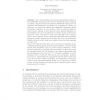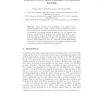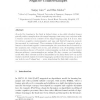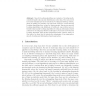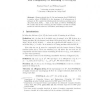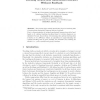ALT
2006
Springer
14 years 6 months ago
2006
Springer
Most of the existing active learning algorithms are based on the realizability assumption: The learner’s hypothesis class is assumed to contain a target function that perfectly c...
ALT
2006
Springer
14 years 6 months ago
2006
Springer
Abstract. The present study aims at insights into the nature of incremental learning in the context of Gold’s model of identification in the limit. With a focus on natural requi...
ALT
2006
Springer
14 years 6 months ago
2006
Springer
A model for learning in the limit is defined where a (so-called iterative) learner gets all positive examples from the target language, tests every new conjecture with a teacher ...
ALT
2006
Springer
14 years 6 months ago
2006
Springer
Consider an agent interacting with an environment in cycles. In every interaction cycle the agent is rewarded for its performance. We compare the average reward U from cycle 1 to ...
ALT
2006
Springer
14 years 6 months ago
2006
Springer
Abstract. Smooth boosting algorithms are variants of boosting methods which handle only smooth distributions on the data. They are proved to be noise-tolerant and can be used in th...
ALT
2006
Springer
14 years 6 months ago
2006
Springer
e-Science is scientific investigation performed through distributed global collaborations between scientists and their resources, and the computing infrastructure that enables this...
ALT
2006
Springer
14 years 6 months ago
2006
Springer
ALT
2006
Springer
14 years 6 months ago
2006
Springer
Higman showed that if A is any language then SUBSEQ(A) is regular, where SUBSEQ(A) is the language of all subsequences of strings in A. We consider the following inductive inferenc...
ALT
2006
Springer
14 years 6 months ago
2006
Springer
We consider the problem of online learning in settings in which we want to compete not simply with the rewards of the best expert or stock, but with the best trade-off between rew...
ALT
2006
Springer
14 years 6 months ago
2006
Springer
The present paper mainly studies the expected teaching time of memoryless randomized learners without feedback. First, a characterization of optimal randomized learners is provided...
